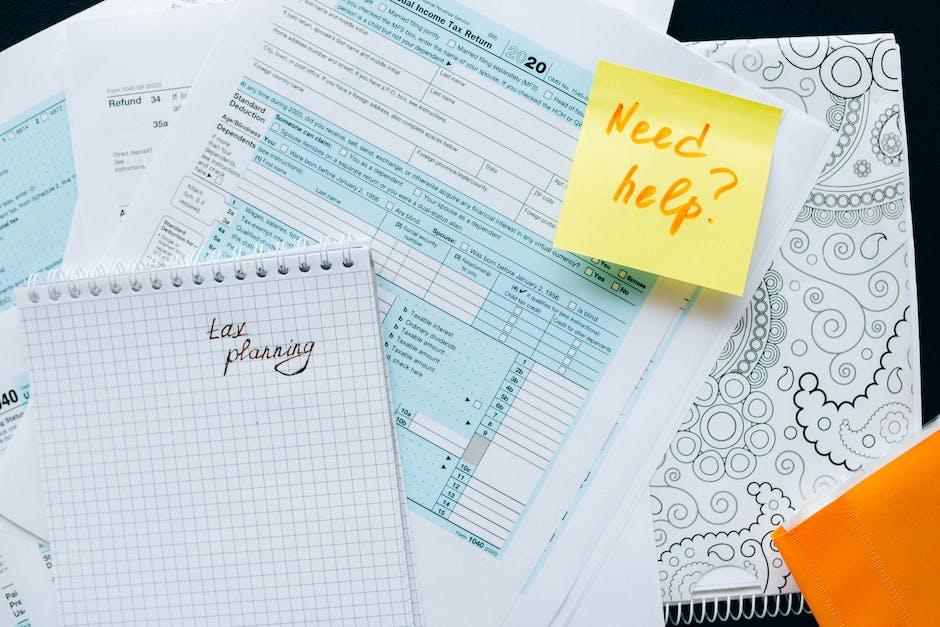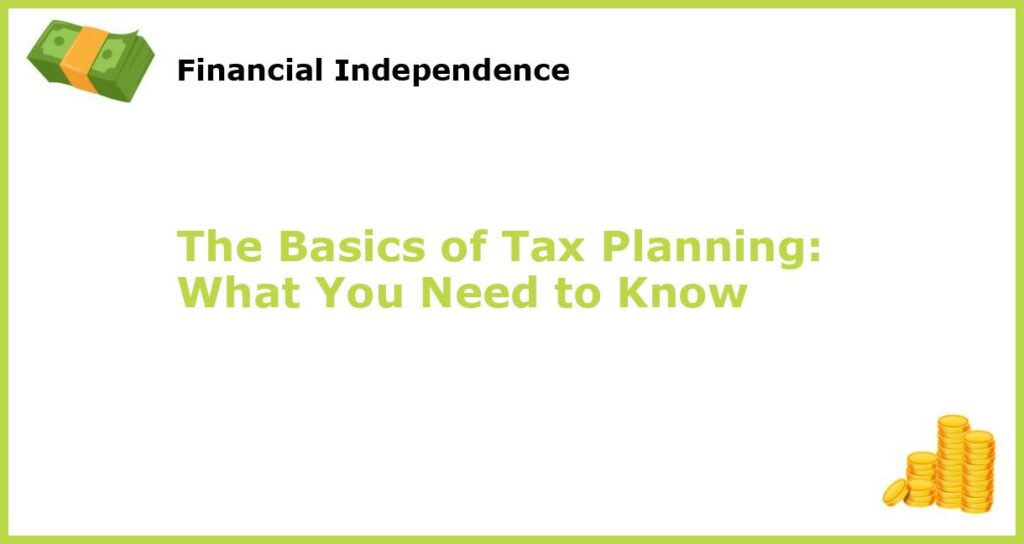Tax planning, though it may seem like a complex concept for many, is, in reality, a very straightforward process. It is the process of analyzing your financial situation to maximize tax efficiency and minimize tax liability – something that is essential for both personal and business finance. Tax planning helps you take advantage of tax breaks and deductions, which reduces your overall tax burden, leaving you with more money in your pocket. By planning ahead, you can make sure that you aren’t losing a significant portion of your hard-earned money to hefty taxes.
1. Why Tax Planning is Important

Everyone wants to minimize their tax liability, and tax planning is the key to achieving that. Tax planning helps you take advantage of tax laws, which help you save money on taxes. In other words, tax planning ensures that you are paying the right amount of tax, not more, and not less. It helps you maximize the deductions and credits that you are entitled to, which, in turn, lowers your tax liability. Not only does tax planning reduce your tax bill, but it also helps you plan your finances smartly.
The benefits of tax planning are not just limited to individuals but are equally essential for businesses. For businesses, tax planning saves money, which can then be used to invest in business expansion or other investments. It also helps in creating a stable business environment while ensuring compliance with tax laws and regulations. Thus, a good tax planning strategy can help you stay financially stable and create financial security.
2. The Difference Between Tax Planning and Tax Preparation

Tax planning is the process of analyzing your finances to minimize your tax liability. On the other hand, tax preparation involves the actual filing of tax returns. While tax preparation is a necessary task, tax planning is essential in creating long-term tax savings. Tax planning requires you to take proactive steps like investments in tax-deferred accounts, itemizing deductions, and more, while tax preparation includes data collection and submission of tax returns to the IRS.
While both are important tasks, tax planning provides the opportunity to maximize savings by optimizing tax deductions, credits, and exemptions. Tax planning also allows you to plan ahead for the future and not just focus on the current tax year.
3. Understanding Tax Brackets and Marginal Tax Rates

One of the most important aspects of tax planning is understanding tax brackets and marginal tax rates. Tax brackets are the different income ranges that are subject to different tax rates. The United States has seven tax brackets, ranging from 10% to 37%. Marginal tax rates, on the other hand, are the tax rate applied to the next dollar of income earned. Thus, if you know the marginal tax rate and your income, you can plan your income effectively.
If you have income that is subject to higher tax brackets, you can consider income deferral or income splitting by transferring income to a lower-income spouse or relative. Additionally, deductions and credits can also reduce taxable income, thus lowering the overall tax liability. Understanding how these tax rates works, can help you make smart tax planning decisions that will beneficial in the long term.
4. Retirement Planning and Taxes

Retirement planning is the perfect opportunity to save money on taxes. By investing in retirement accounts like 401(k)s, traditional IRA’s or Roth IRA’s, you can reduce your taxable income while simultaneously saving for the future. Contributions made to these accounts are tax-deductible, meaning you can lower your tax liability while building wealth for retirement. With retirement plans, you get the opportunity to defer tax on your retirement savings until your retirement, allowing you to access your pension without paying any additional taxes. An added bonus is that when you retire, your tax bracket may be lower, further reducing your tax liability.
5. Business Expenses and Tax Deductions

If you run a business, you may be able to deduct certain expenses on your tax return. The IRS allows plenty of business-related expenses that can be claimed as deductions, such as depreciation, rent or mortgage payments, employee salaries, and more. by taking advantage of these deductions, you can lower your taxable income and reduce your overall tax liability. Business owners can also plan their finances to take advantage of tax credits, like the Qualified Business Income Deduction or the Work Opportunity Tax Credit. Understanding your business expenses and how to take advantage of them can help you maximize your tax savings.
6. Charitable Donations and Tax Benefits
Charitable donations offer dual benefits: it allows you to give back to your community and provide tax benefits. Contributions made to qualified charitable organizations are tax-deductible, meaning you can lower your tax liability while making a difference in your community. However, it’s important to understand what constitutes as a qualified organization and how much you can deduct. You can donate assets like stocks, property or cash to a charitable organization; these donations can also help lower your overall taxable estate.
7. The Importance of Record-Keeping
Keeping detailed records of your income, expenses, and deductions is essential for effective tax planning. Proper record keeping will enable you to minimize tax liability while avoiding costly mistakes. It’s important to retain documents like receipts, invoices, reports, and bank statements and keep them organized. Proper record-keeping not only helps you keep track of your finances, but also helps provide documentation if you are ever audited by the IRS.
8. Timing Matters in Tax Planning
The timing of financial decisions is crucial when it comes to tax planning. Smart timing can have a significant impact on reducing your tax burden. For example, you might receive a substantial sum at the end of the year – it may be wise to defer that sum till the following year to avoid pushing into the next tax bracket. Timing can also apply to when to make business purchases or when to begin certain types of investments. By considering timing in your tax planning, you can make smart decisions that can save you money in the long run.
9. The Risks of Tax Evasion
As tempting as it may be to underreport income or overstate deductions, tax evasion is not only illegal but can result in severe penalties in the form of hefty fines and even prison time. Tax evasion can also have long-term life consequences like damaged credit score, inability to obtain loans or credit in the future, and can also reduce your credibility as a reliable taxpayer. So, rather than risk legal consequences, it is better to work with a qualified tax professional and comply with all necessary regulations.
10. The Benefits of Professional Tax Planning
Tax laws are always changing, making tax planning a complicated task. Working with a qualified tax professional allows you to concentrate on growing your business while leaving the tax requirements to be professionally handled. Tax planning professionals like accountants, enrolled agents, attorneys, or tax consultants can help navigate complex tax laws, identify opportunities for tax savings, and ensure that you are complying with all necessary regulations. Tax laws are complicated and constantly changing, and it’s crucial to stay updated with these laws to ensure your tax planning is relevant and accurate. By working with a professional, you can maximize your tax efficiency while minimizing your overall liability.







